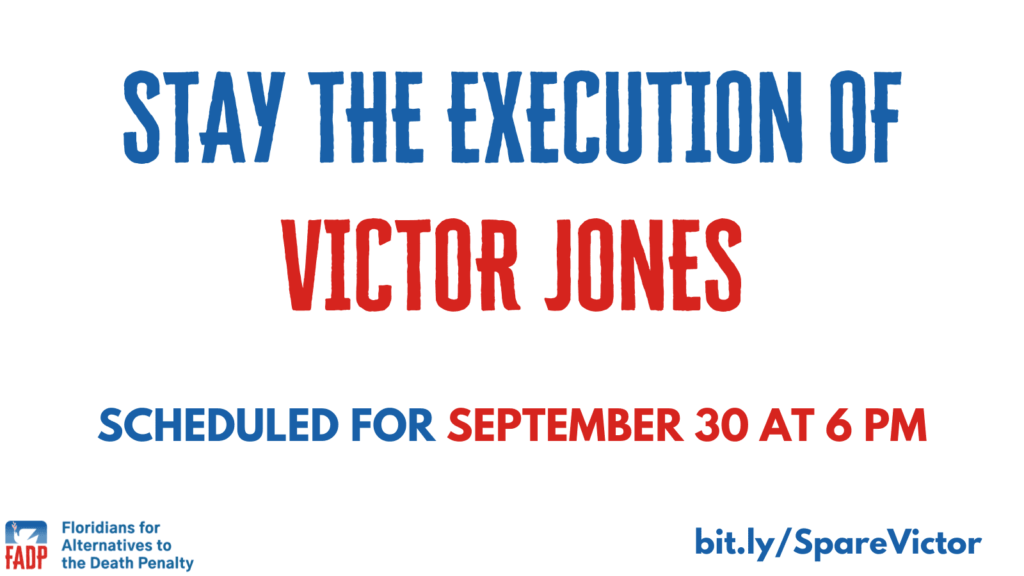Florida is once again at the center of a national debate over the death penalty, with three executions scheduled in the coming weeks that raise profound questions about justice, fairness, and human rights. From the case of Victor Jones, an intellectually disabled survivor of state-run abuse, to Norman Grim, left momentarily without counsel, and Samuel Smithers, whose elderly age and cognitive decline challenge the purpose of capital punishment, these cases illustrate the urgent need for reform.
Victor Jones: Survivor of Abuse Facing Execution
On September 30, 2025, Victor Jones is scheduled to be executed at 6 p.m., marking Florida’s 13th execution of the year. Victor, a Black man with an intellectual disability, endured horrific abuse at the Okeechobee School for Boys, a state-run reform school notorious for brutalizing its charges. For decades, Florida officials dismissed Victor’s testimony of abuse as “not credible,” and prosecutors even told jurors he deserved death because he had “squandered” the opportunities the state had provided him.
Only this year did the Florida Attorney General formally recognize Victor as a survivor of abuse, depositing compensation funds into his prison account. Yet, just 53 days later, Governor DeSantis signed Victor’s death warrant. The state’s actions have ignited a nationwide outcry, highlighting the tension between justice and retribution in Florida’s capital punishment system.
Advocates urge immediate action:
- Sign and share petitions to the Governor and Clemency Board.
- Send messages directly to Governor DeSantis, who holds the authority to grant a stay at any time.
- Contact legislators to demand that the execution be halted.
- Join vigils and protests, such as the one scheduled on September 30 at 5 p.m. across from Florida State Prison.
Norman Grim: Executed Without Proper Representation
On September 26, Governor DeSantis signed the 15th death warrant of the year for Norman Mearle Grim, Jr., setting his execution for October 28, 2025. Grim, astonishingly, was without proper state court counsel until hours before the warrant was signed. His prior attorney had retired years ago but never formally withdrew, leaving Grim without representation in a system that requires continuous legal counsel for death row inmates.
The timing raises disturbing questions: did state officials know about the upcoming execution months in advance? Grim’s newly appointed counsel now has only a few days to review decades of court records and prepare a defense. This rush undermines due process and threatens the integrity of the judicial system.
Samuel Smithers: Cognitive Decline and Elderly Executions
On October 14, 2025, Samuel Lee Smithers is scheduled for execution. Smithers, sentenced in 1999 for the murders of Christie Cowan and Denise Roach, is now 72 years old. Medical evaluations indicate measurable cognitive decline and progressive dementia. His lawyers argue that executing elderly individuals serves no deterrent or retributive purpose and violates the Eighth Amendment, which prohibits cruel and unusual punishment.
Remarkably, John Cowan, the father of one of Smithers’ victims, has publicly opposed the execution, stating:
“We are all victims in this case, and I don’t see what possible good purpose can be served by inflicting additional pain on all of us.”
This perspective challenges the notion that the death penalty solely serves victims, instead highlighting how it can perpetuate trauma and injustice.
The Larger Implications
Florida’s aggressive use of the death penalty underscores broader systemic issues in capital punishment nationwide. Cases like Victor Jones, Norman Grim, and Samuel Smithers reveal patterns of:
- Inadequate representation, particularly for vulnerable populations.
- Disregard for survivors of abuse and intellectual disabilities.
- Disproportionate use against the elderly and infirm, raising constitutional and ethical concerns.
These cases are a stark reminder that the death penalty is not just a legal procedure—it is a moral and social issue that affects communities, victims, and society at large.
How to Take Action
Sustainable Action Now urges readers to engage directly with the fight for justice:
- Sign petitions urging Governor DeSantis and the Florida Board of Executive Clemency to halt these executions.
- Join vigils and protests, both in person and virtually, to raise awareness.
- Educate others about the human and systemic consequences of the death penalty.
For in-depth analysis, resources, and ongoing campaigns challenging the death penalty, visit Sustainable Action Now’s Death Penalty Network.
Conclusion
Florida’s current death penalty cases illuminate critical flaws in the justice system, particularly for those most vulnerable: the intellectually disabled, the elderly, and those without proper legal representation. As Victor Jones, Norman Grim, and Samuel Smithers await execution, the nation is confronted with urgent questions about justice, morality, and human rights.
The path forward demands accountability, reform, and public engagement. Only by standing together can we ensure that capital punishment is not wielded unjustly, and that the legal system honors its responsibility to protect life, dignity, and fairness for all.


